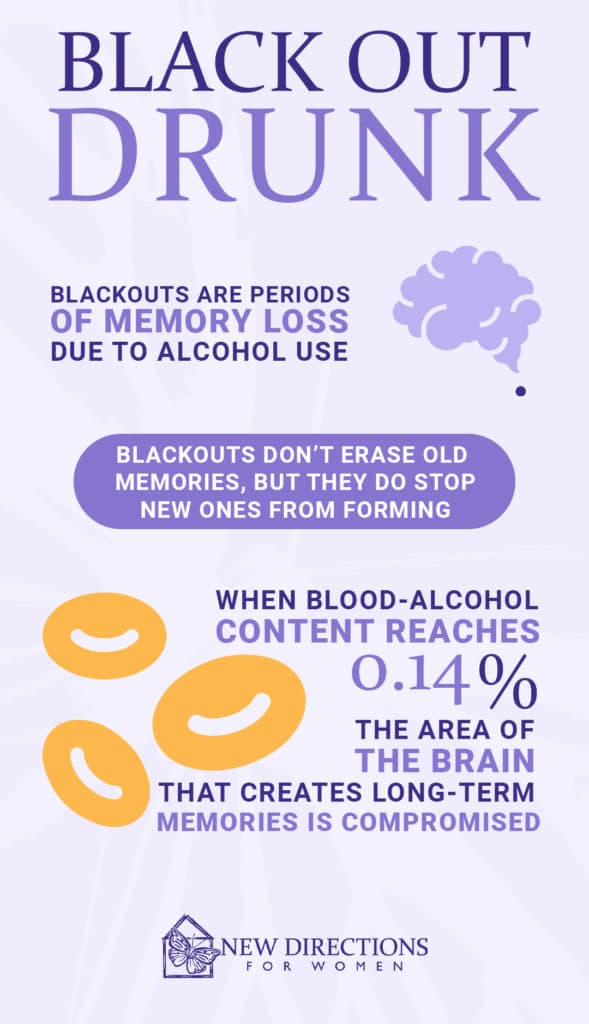If you’ve seen the 2009 film “The Hangover,” you know about blacking out from drinking alcohol. The four main characters have a wild night of partying and then wake up the next morning unable to recall a single memory from the night before. Although the movie portrays getting “blackout drunk” as funny, this can be a serious and dangerous situation, especially for women.
When you’re out with the girls, you might drink too much to the point where you do something embarrassing, and you can’t remember it the next morning. If you’ve regularly drunk alcohol, you can relate to this experience.
Women can experience several kinds of blackouts, usually due to a medical condition. For the sake of this article, however, we’ll focus on alcohol blackouts. To prevent these from happening, you must know about how and why they occur.
What is Blacking Out from Drinking?
In terms of drinking, blackouts are periods of memory loss due to alcohol abuse. Although women don’t lose consciousness when they’re “blackout drunk,” they aren’t recording what’s happening to be able to remember it later. Blackouts don’t erase old memories, but they do stop new ones from forming. 
However, blacking out from drinking can cause serious brain damage with continued alcohol abuse. It can eventually cause permanent memory loss as well. It can also cause severe memory disorders like “wet brain,” known professionally as Wernicke-Korsakoff syndrome.
How Do Blackouts Happen?
Blackouts happen due to a problem with long- and short-term memory encoding. When you reach a certain blood alcohol content level (about 0.14%), the area of your brain that creates long-term memories is compromised. This simply means that you won’t be able to remember anything that happened during this time, which causes blacking out from drinking.
When we’re not drinking, any information we perceive enters our sensory memory, even though this only lasts a few seconds. If this information is important, it goes into our short-term memory. Memories move to long-term storage with enough processing, motivation, and rehearsal. However, this action is impaired when we’re drinking heavily.
Risk Factors of Blackouts
Certain people are at a higher risk of blacking out from drinking than others. Some risk factors include:
- A family history of alcohol abuse
- Experiencing a recent blackout
- Not eating much earlier in the day or since starting to drink
- Being in a fraternity or sorority in college
- Frequently pregaming or pre-partying before going out
- Playing drinking games that involve shots of hard liquor
- Drinking too much alcohol too fast
Women are more likely to black out than men. This is because women have less water in their bodies to dilute alcohol, as well as less gastric dehydrogenase, an enzyme that helps break down liquor. For this reason, a woman’s blood alcohol content (BAC) is likely to rise faster than a man’s BAC.
Types of Alcohol Blackouts
There are two main types of blackouts that can happen after drinking too much: complete blackouts and fragmentary blackouts.
- Complete blackout: In a complete (or “en bloc”) blackout, you can’t recall anything that happened, even if someone told you about it. According to the National Institute on Alcohol Abuse and Alcoholism (NIAAA), complete blackouts act as if “the process of transferring information from short-term to long-term shortage has been completely blocked off.”
- Fragmentary blackout: This creates memory lapses, but only in small chunks. People who suffer from these can usually remember parts of an event if someone tells them about it. If parts of the night before seem fuzzy, but you can still recall some parts of it, you’ve probably had a fragmentary blackout. Fragmentary blackouts are more common than complete ones.
Passing Out vs. Blacking Out from Drinking
 It’s important to note that some people confuse blacking out from drinking to passing out. When you pass out from drinking, you lose consciousness.
It’s important to note that some people confuse blacking out from drinking to passing out. When you pass out from drinking, you lose consciousness.
Signs that Blackouts Are Getting Out of Hand
Alcohol use disorder can creep up on you. When you and your friends are frequently drinking, the signs might be there, but you might also deny that you have a problem.
If you’re having frequent blackouts or were recently blacking out while drinking, it’s time to take a hard look at your drinking habits. You might even need to consider stopping drinking altogether. You should look out for signs that you’re having too many blackouts or that they’re getting out of hand.
-
You can’t remember what happens when you drink.
This is one of the main indicators that blacking out while drinking has gotten out of control. If you can’t remember a large chunk of time (like in a complete blackout), you might feel anxiety about not knowing what you did or said. Maybe you made a fool of yourself or said something to make a friend feel uncomfortable. It’s possible that you told someone’s secret. There could even be recordings or photos of what happened.
If you have a good relationship with alcohol, you won’t have trouble remembering what happened when you were drinking. However, if you’re drinking so much that your memory is affected, you could have a problem.
-
You don’t always feel safe after drinking.
If you’re “blackout drunk,” chances are you’re unable to look after yourself. This can be especially dangerous if you’re alone and taking a cab or walking home from a bar. Studies show that heavy drinking puts people at a high risk of injuring themselves. In fact, this risk of injury increases by about 339% when you’re drunk.
Another problem with blacking out while drinking is that it lowers your inhibitions and impairs your decision-making, including your consent to sex. Of course, a woman’s inability to say “no” does not mean consent in any way, and she should not be responsible for avoiding sexual assault. Unfortunately, being “blackout drunk” makes you less able to leave dangerous and unwanted situations. About 79% of sexual assault victims were drinking when the crime happened.
Consensual sex can also be dangerous when you’re blacking out while drinking. This can lead to unprotected sex, which can result in an unwanted pregnancy or contracting a sexually transmitted infection (STI).
The next time you go out, come up with a plan beforehand. Limit how much you drink, and have your friends watch how much you drink, too. Also, be sure to lay out what behaviors are considered okay as well as ones considered unacceptable.
-
Your blackouts affect your relationships.
While you’re “blackout drink,” you might think you’re acting normal at the time. However, the people you love are seeing you with sober eyes, and you probably aren’t fine. If you drink socially and tend to blackout, your loved ones have probably frequently seen you like this. This can be devastating to see since you can’t even remember what happened.
Sometimes when people blackout, they can act out of character. Those who are normally relaxed and calm can become angry and belligerent. This can be especially concerning for your family. Even if you are a fun and outgoing person while in this state, it can still make you uncomfortable.
Alcohol can change your personality, and blacking out while drinking can change it even further. Some negative behaviors linked to blackouts include:
- Angry behavior (shouting, throwing things)
- Inability to take care of yourself
- Acting inappropriately toward friends, family, and coworkers
- “Blackout rage”
- Uncontrollable crying or sadness
Sadly, these negative behaviors can affect your relationships with your loved ones. You might find that friends don’t invite you to as many social gatherings since you make them feel uncomfortable. They also might not want to feel responsible for you every time you get together.
-
You have drinking-related health problems.
Frequently blacking out from drinking can take a massive toll on your body. Binge drinking can lead to alcohol poisoning, both mild and severe. Although this might only last a few hours, it can result in vomiting, seizures, coma, or even death.
Alcohol is also linked to mouth, esophagus, breast, colon, liver, voice box, and throat cancers.
Other long-term effects of alcohol use disorder include:
- Weight gain
- Anxiety and depression
- Cancer
- Heart failure
- Lowered brain function (i.e., difficulty concentrating)
- Reduced liver function
- Sleep problems
-
Your blackouts usually involve other substances.
There are some drugs besides alcohol that can cause blackouts. When you combine these with drinking, your blackouts can get even worse. The opioid epidemic is getting worse every year, with the risk of using prescription painkillers like OxyContin and Vicodin while drinking increasing as well.
The College Alcohol Study (CAS) found that people who binge drink often are four times more likely to use marijuana, six more likely to use hallucinogens, and five times more likely to use LSD and amphetamines.
If taken with alcohol, drugs like opioids, marijuana, benzodiazepines, and stimulants can make you blackout. Since opioids and “benzos” are depressants like alcohol, drinking enhances these effects, putting you at a higher risk of overdose.
How to Prevent Blackouts
If you’ve been blacking out from drinking too much, you’re most likely ready to put that life behind you. In your mind, the first step could be cutting out certain types of alcohol that heavily affect you. However, you must acknowledge that blacking out is a larger symptom of alcohol abuse, which is a stepping stone to addiction.
Treatment for Alcohol Addiction at New Directions for Women
At our women’s rehab center in Costa Mesa, CA, we know how much alcohol can impact a woman’s life. We also know that every person is different. That’s why we offer comprehensive alcohol addiction treatment plans for every one of our patients.
We recommend medical detox for women with a severe alcohol use disorder. This will rid their body of harmful toxins, therefore also getting rid of the body’s dependence on alcohol. Following this, residential treatment, partial hospitalization programs, and outpatient treatment are all options for you.
After treatment is complete, we recommend that you attend a support group like Alcoholics Anonymous (AA) to keep your sobriety in check. We also offer several resources so that you can start your life anew without drinking.
If you’re suffering from alcohol blackouts and you want to get your life in order, contact New Directions today. Our representatives will inform you of our programs and determine the right one for you.












